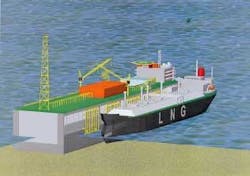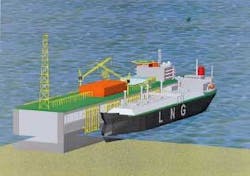French offshore contractors start year with major contracts
Jeremy Beckman
Editor, Europe
This year has started well for France's leading offshore engineering contrac-tors. Both Technip and the Paris-based division of Stolt Offshore have picked up some of their most prized orders to date. These include:
- A $730-million contract from BP for the flowlines, risers, umbilicals, and subsea structures for the Greater Plutonio development in Angola block 18. The two companies are undertaking the work as a consortium, with manufacturing split between plants in France and Angola
- An engineering and construction contract for a spar hull and associated moorings/production risers for Kerr-McGee's Constitution field in the Gulf of Mexico, awarded to Technip.
In January, Stolt also announced a joint venture with Kazakhstan's Transport Ministry and state oil company KazMunaiGas to build and operate construction vessels and yards in the Kazakh Caspian Sea. These developments should also have a beneficial, trickle-down effect for the specialist French suppliers that have traditionally worked closely with Technip and Stolt. More pickings look likely later in the year, assuming Total gains clearance for the deepwater Akpo project in Nigeria.
The one worry for the two engineering giants may be the financial implications of these contracts. Stolt over-stretched itself on the Bonga development, due to work-scope issues. This was one factor behind Stolt's recent heavy losses, which led to it incurring $200 million of equity debt. The situation will have to be addressed through trimming its construction fleet. Profits have been further dented by the spiral of man-hour-intensive, deepwater front-end engineering bids, which are demanded, then rejected, by some major operators.
Ideally, oil companies should be helping their installation contractors invest in new equipment for the next generation of frontier projects. Reality dictates that their own bottom line takes priority, says Dominique Michel, chairman of the Exploration & Production Committee of the French oil and gas suppliers' body, GEP.
null
Across Europe, the oil industry is still perceived as being synonymous with pollution. This image tends to be reinforced by national governments, says GEP's managing director, Didier Treussier, "who will talk a lot about energy needs, without mentioning oil and gas."
"The picture is exacerbated by individual politicians," Michel adds.
Total tried to address its image problems this February by staging an exhibition in Paris on the industry's technical achievements, largely directed at teenagers and students. Like other oil majors, Total is concerned that engineering graduates are turning away from oilfield careers.
Michel's own company, Doris Engineering, has no such recruitment problems. "We get three or four resumes every day," he says. But the sheer scope of some of offshore EPCI projects is placing severe strains on contractors, he points out. "Average engineering man-hours for an FPSO can range from 800,000 to 1 million, with around 150,000 man-hours for the associated umbilicals and flowlines. If you take all that into account, there is a shortage of manpower."
European cooperation
In its quest to relieve its own members' burden, GEP has teamed up with counterpart supplier bodies in Western Europe to form Eurogif, the European Oil and Gas Innovation Forum. Eurogif has drawn up a Technology Master Plan, which sets out R&D priorities for Europe's service and supply industry. These have been split into thematic networks, including smart reservoirs, floating structures, and subsea/downhole production systems.
Eurogif seeks to promote co-operation with operators, universities, and research institutes to develop new systems and techniques for hydrocarbon exploration and production. The main aim is to secure Europe's energy supply sources for as long as possible. To this end, it has sought funding from the European Union under its fifth and sixth framework programs, with limited success. Renewable energies strike more of a chord in the corridors of power in Brussels. However, a new commission council is being elected this year, and a new cluster of supplier councils and individual companies has been established, called Eurogia, which will restate the case for project funding.
GEP currently has 150 member companies. Most of these are French, although it now also accepts applicants from other countries in Europe, provided they have an office somewhere in France. According to Treussier, seven of its latest recruits are from the logistics/freight-forwarding sector.
"They are looking for us to provide infor-mation on potentially big oil and gas transportation projects," he said.
This year, GEP is organizing stands for its members at OTC in Houston and ONS Stavanger, and has also been appointed to run the 170-sq-m EU stand at OTC. This will provide free exhibition space to 12 European companies. Aside from trade shows, it continues to mount missions to emerging oil and gas regions, with presentations followed by face-to-face meetings with state-run bodies. One such get-together is planned in Almaty, Kazakhstan, following the Caspian Oil & Gas event in Baku in June.
Another mission is scheduled just after OTC to the Caribbean, taking in Pdvsa in Venezuela and Trinidad and Tobago.
"Quite a few of our companies are already present in Venezuela," Treussier points out, "led by Total, CGG, and Geoservices. In Trinidad and Tobago, there are also opportunities for our service companies."
In the longer term, GEP aims to increase contacts with Pemex in Mexico, a market that some French suppliers seem to believe is cornered by US contractors, according to GEP's information director, Helene Tarabout. Libya is another targeted sector.

